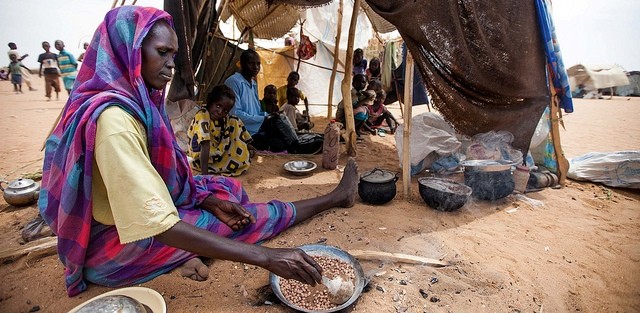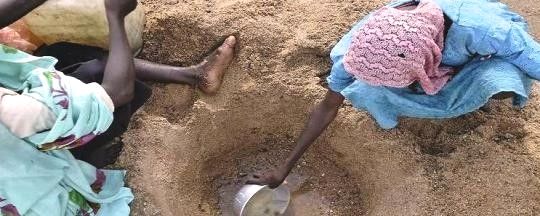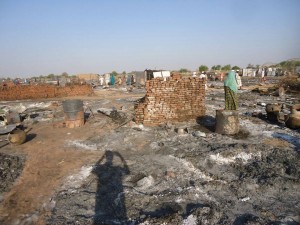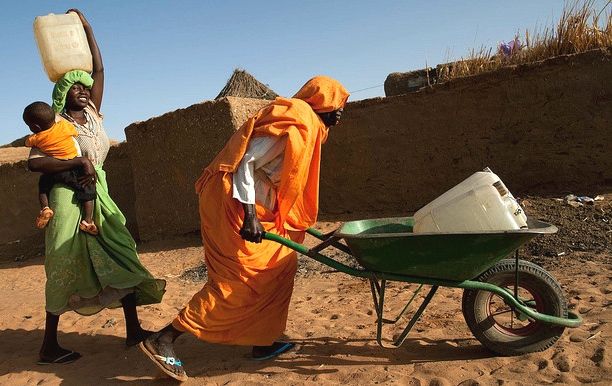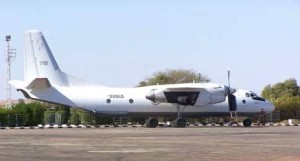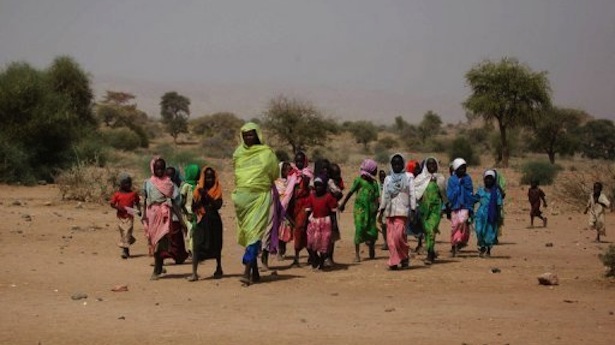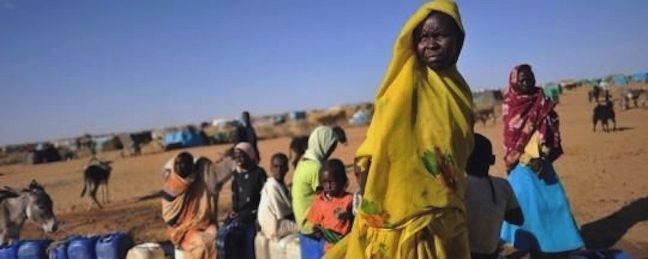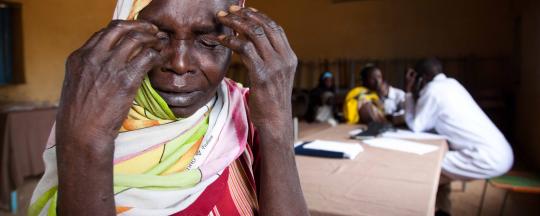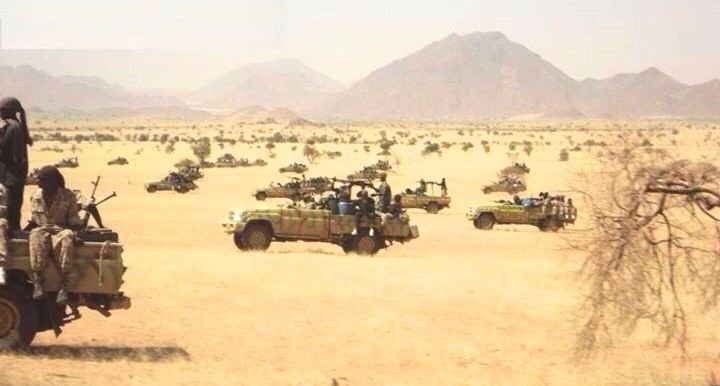As I noted a week ago, for six years Radio Dabanga has been by far our most important and reliable source of information about what is occurring in Darfur. The UN Secretary-General’s quarterly reports on Darfur and UNAMID—depending as they do primarily on information from the incompetent and failing “hybrid” Mission—are largely worthless, and frequently contain scandalous omissions. There have been periods, for example, in which Ban Ki-moon has either not mentioned sexual violence at all, or done so in the briefest and least revealing of terms. This is ultimately one reason that the mass sexual assault on Tabit, North Darfur occurred: a widespread conviction of complete impunity for such crimes. Notably, the Tabit attack was reported by Radio Dabanga in largely accurate terms the day after the event ended, in contrast to the disgracefully dishonest reporting by UNAMID nine days later. The final word on the rapes at Tabit is the Human Rights Watch report of February 11, 2015—a complete rebuke of UNAMID’s (non)findings.
But even as the UN Secretary-General was acquiescing before Khartoum’s hostility to any reporting on rape—or malnutrition, or global mortality—Radio Dabanga was daily providing updates, including specific incidents of rape, murder, and assaults; humanitarian conditions in particular camps; incidents of aerial attacks on civilians; and the inexorable claiming of African farmland by Arab groups, typically heavily armed. It is hardly surprising that in a May 2014 report to the Sudanese parliament, a regime official noted in frustration that the “majority of the people in Darfur and Kordofan prefer Radio Dabanga to any national broadcasting station.” Increasingly, Radio Dabanga is reporting on other parts of Sudan as well.
As interested as the people of Darfur and North Kordofan may be, however, there seems to be a broad unwillingness in the international community to take seriously what is reported by Radio Dabanga. Thus while the steadily accelerating upsurge in violence throughout Darfur over the past three years would have been clear to anyone reading dispatches from Radio Dabanga, it has still not registered fully with many international actors of consequence, nor have policies toward Khartoum have been adjusted accordingly.
It seems to me unconscionable that such important information is ignored, in part because it is not sufficiently disseminated. This, then, is the second t in what will be series of digests attempting to highlight the most important and broadly significant of Radio Dabanga’s most recent dispatches; I have limited the number to ten, selecting only from the past week what seemed to me most representative of conditions on the ground in Darfur; thus the present digest goes back only to March 1, 2015, and is still perforce highly selective. All dispatches have been edited to some degree for length; any editorial comments on my part appear in italics; all emphases within the texts have been added.
[1] Food rations stopped for displaced in Gireida, South Darfur | March 8, 2015 (Gereida Locality, South Darfur)
The residents of the Gireida camps for the displaced in South Darfur did not receive food rations in January and February. A sheikh of Abdos camp informed Radio Dabanga that the displaced in the Gireida camps are currently living in a “very difficult humanitarian situation.” He appealed to the World Food Programme to resume the distribution of the rations “as soon as possible, especially because we could not farm this season as a result of increased attacks by government-backed militiamen.” The camp elder also complained of a severe lack of medicines and health staff.
[UN OCHA recently estimated that 1.2 million Sudanese children under 5 are acutely malnourished; a tremendous percentage of these most vulnerable human beings are in Darfur. One reason is that need for food in Darfur hopelessly exceeds the ability of the humanitarian community to provide it—hence the absence of food rations for over two months in the Gireida camps for displaced persons. Khartoum’s frequent denial of access—as well as rampant insecurity, completely uncontrolled by UNAMID—is in many cases the primary reason for food shortages; this is by design.]
A displaced woman, recently arrived in Kalma camp; it is difficult to know how many the food that appears here must feed.
[2] Drinking water crises throughout Darfur | March 6, 2015 (El Radoom / Adila (South Darfur) / Tawilla (North Darfur))
Obtaining drinking water in South Darfur proves to be difficult for the residents of one village, owing to the stalling of the only operating water engine in the area. Meanwhile, people in Adila locality continue to suffer from the drinking water crisis. Displaced people in North Darfur camps face the same problems. The residents of El Tomat village, at the border of Dimso and El Radoom localities, revealed to Radio Dabanga that this water engine has stalled since mid-February. The people currently fetch water from an area named Karti Karti, about 10 km from the village. In East Darfur’s Adila locality, the drinking water crisis entered its tenth consecutive day. The water engines in the area have broken down and residents have to pay more for barrels of water. They, too, appealed to the local authorities to immediately solve the problems with the engines. Reportedly six out of the nine water pumps are not working anymore.
The UN humanitarian office (OCHA) reported in its latest weekly bulletin that an inter-agency mission to three camps for internally displaced people in Tawila locality, North Darfur, discovered a significant water supply problem. Particularly in Argo camp, besides Dali and Rwanda camps, it is difficult to obtain drinking water. From 40 different water sources tested, 14 samples were contaminated with bacteria, according to the State Ministry of Health’s Environmental Health Department. Water chlorination has been recommended for all camps in Tawila locality.
[Water shortages, in addition to causing dehydration, often drive people to drink unsanitary water. As the UN OCA report indicates, contamination of water sources is commonplace, given the staggering water demands of so many displaced persons and the lack of adequate latrine and sanitary provisions. This can lead to major outbreaks of deadly diseases.]
People without water will drink almost anything
[3] Rape, pillage, arson in Darfur’s Jebel Marra | (March 3, 2015 | Golo, West Jebel Marra)
Three young women were gang-raped, 299 houses and 56 storerooms were torched today, in an attack on villages in the area of Golo, in West Jebel Marra. Fleeing villagers told Dabanga that a joint force of paramilitary Rapid Support Forces and army troops moved this (Tuesday) morning from Jebel Birto, north of Golo, towards the villages of Birdani, Kara, Korma, Loni, and Tiro. “They pillaged all the houses in the villages before torching them. They even took the chicken and children’s clothes,” one reported. “In the village of Loni, three young women were gang-raped,” he added.
“The attackers torched 98 houses, and 18 storerooms containing 406 (100kg) sacks of sorghum in Birdani. In Korma, 72 houses and 16 storerooms with 308 sacks of sorghum burned to ashes. 48 houses and six warehouses with 102 sacks of sorghum were destroyed in Kara, 45 houses, and 10 storerooms containing 82 sacks in Loni, and 36 houses and four large storerooms with 443 sacks of sorghum were torched in Tiro.”
The villagers told Dabanga that they fled to the nearby mountains and valleys, west of their villages. “The only belongings, we could save, are the clothes we were wearing.” They expressed their fear that many of the people who fled may die of thirst and hunger, in particular as all their food was robbed or torched. “In addition, the government forces are blocking all the roads leading to Golo, to safer places, and the water sources.”
[This is scorched-earth warfare that is indistinguishable from the nature of genocidal counter-insurgency at the beginning of conflict in Darfur—twelve years ago. The deliberate burning of foodstocks, then and now, is a violation of the 1948 UN Convention on the Prevention and Punishment of the Crimes of Genocide: “Deliberately inflicting on the group conditions of life calculated to bring about its physical destruction in whole or in part” (2.c). The “group” of course is the African tribal groups of Darfur, who remain—overwhelmingly—the targets of attacks and destruction of livelihoods by Khartoum and its militia allies.]
The remains of an IDP camp after an attack by the Rapid Response Forces (RSF), the Khartoum-backed militia force rampaging throughout Darfur, especially North Darfur
[4] Water outage in East Darfur’s Adila enters ninth day | (March 5, 2015 | Adila Locality)
The drinking water crisis in Adila, [formerly South] Darfur, has worsened. As the crisis enters its ninth day, two more water engines have broken down. “There are no indications that the problem will be solved soon,” a resident of Adila reported to Dabanga. The situation even deteriorated after two more engines broke down. “Six out of the nine water pumps are now not working anymore. The price of a barrel of water on the market has reached SDG40 ($6.65), because of its scarcity.” He said that the people of Adila queue all night for those water pumps that are still operating. “Even then, they do not obtain enough water to last the whole day.”
[Such dire water shortages lead to the drinking of contaminated water; UN OCHA recently reported an alarming increasing in the number of bacterially compromised water sources in Darfur.
[See also Radio Dabanga: “Thirst in Adila locality, [formerly South] Darfur,” March 3, 2015 and “Irrigation engines stolen in North Darfur,” March 3, 2015 | Adila [formerly South] Darfur. The theft of irrigation engines is an enormously destructive act.]
Women must often wait in extremely long lines or travel long distances to get clean water
[5] Woman raped, air raids resume in East Jebel Marra, Darfur | (March 1, 2015 | East Jebel Marra)
Two members of a government militia raped a 25-year-old woman near the village of Faluja on Saturday. “She was returning to Faluja village with water from a well in the neighbourhood. The men ambushed her and raped her alternately.” Speaking to Dabanga, a relative of the victim said that two militiamen wearing military uniforms attacked the woman about 10 kilometres south of Dubo El Madrasa.
On Sunday, the Sudanese Air force resumed its bombardments on the area south of Dolma. The area of Kaja, south of Dolma, witnessed aerial bombardments on Sunday. “The four bombs that were dropped caused panic among the population who fled into the nearby valleys and mountains. Two donkeys were killed, and tracts of farmlands and pastures went up in flames.
[This the life the people of eastern Jebel Marra live—day after day after day, with no end in sight. The international community is doing nothing to halt either sexual assaults in Darfur or aerial bombardment of clearly civilian targets.]
An Antonov-26, Khartoum’s primary aerial attack plane. A Russian-built cargo plane by design, it has been crudely retrofitted so the shrapnel-loaded barrel bombs may be rolled out the back cargo bay. They have no militarily useful precision, but are extremely efficient at civilian destruction and terror.
[6] Two raped, eight missing in Darfur school group attack | (March 4, 2015 | Golo, Western Jebel Marra)
Two basic school students were raped and eight others are missing after an attack in West Jebel Marra today. “Government troops attacked a group of 17 basic school students at 9 am as they walked from Golo to Nierteti, in Central Darfur, to sit for their final exams,” a parent told Dabanga. “The group of Class 8 students included 10 girls and seven boys,” he explained. “Two of the girls, aged 15 and 14, were found in a ditch after they had been raped. “Eight girls disappeared [their likely fate is almost too painful to contemplate]. As of Wednesday evening, we have not found any trace of them.
Other sources told Dabanga that the government troops stationed at Jebel Birto, north of Golo, consisting of paramilitary Rapid Support Forces (RSF), Border Guards, Central Reserve Police (Abu Tira), other militiamen, and army soldiers, continued their attacks, plundering, and torching houses in the area today. “They raided a number of houses in the area. They beat the residents, robbed them of their belongings, and torched their houses afterwards,” one of them reported. The residents who fled the villages of Birdani, Kara, Korma, Loni, and Tiro, near Golo, yesterday, are still hiding in the valleys and mountains.
[The Rapid Support Forces are engaged in wholesale sexual assaults, murders, and pillaging of houses, villages and IDP camps. There is no indication that the current murderously destructive rampage will diminish any time soon.]
The targets of Khartoum’s campaign of rape used as a weapon of war; children as young as seven and eight have been reported raped by Radio Dabanga
[7] “Tabit mass rape never occurred”: Prosecutor for Crimes in Darfur | (March 8, 2015 | Geneva/Khartoum)
According to an investigation carried out by the Special Prosecutor for Crimes in Darfur, the “alleged mass rape” in Tabit, North Darfur, in late October last year, “never took place.” Esameldin Abdelgader, the Sudanese Undersecretary of Justice, explained in his briefing of the UN Human Rights Council in Geneva last week on the outcome of the inquiry, that women of 88 families in Tabit were questioned. They all denied to having been raped…. Human Rights Watch, in an elaborate report in February, stated that army troops raped at least 221 women and girls in a Tabit over 36 hours last October. It called upon the UN and the AU to take urgent steps to protect the civilians from other violations in Tabit.
[Despite the massive evidence accumulated by Human Rights Watch and the reporting of Radio Dabanga, Khartoum predictably denies that any rapes occurred at Tabit, North Darfur. Such mendacity is entirely characteristic of the regime, and Foreign Minister Ali Karti—recently invited to Washington by the National Prayer Breakfast, hosted by the Congress—is the “denier-in-chief.” But for Esameldin Abdelgader, the Sudanese Undersecretary of Justice, to cite an “investigation carried out by the Special Prosecutor for Crimes in Darfur” is simply fantastic. This is a man who, despite daily atrocity crimes in Darfur, has not managed a single meaningful conviction as Special Prosecutor. His “investigation” was nothing more than a propaganda gambit.]
These women know full well how great the danger is for them and their daughters.
[8] Health care blockade claims three children in Darfur’s East Jebel Marra | (March 1, 2015 | East Jebel Marra)
Three children have died in the area of Barkero, west of Katur, on Friday, of the consequences of diarrhoea, coughing, and swelling of the hands, legs, and neck.
A relative of the children told Dabanga that dozens of children below seven years old are suffering from diseases. “We cannot reach health centres, or obtain any medicines in the area, because of the blockade of the Rapid Support Forces militia. And the authorities deny foreign organisations access to the area.” He added that the people at Barkero estimate that thousands of villagers have fled from Dubo El Omda, El Madrasa, El Jadeeda, Taradona, Tirbo, and Goz Dor.
[We are witnessing a slow decimation of children in areas denied any form of primary medical care by Khartoum.]
Many parents will not see their children turn five years of age because of appalling health conditions in Darfur
[9] Nine-day fire destroys 199 homes in Bindisi camp, [formerly West] Darfur | (March 3, 2015 | Bindisi Camp)
199 shelters have been burned to ashes in Bindisi camp for the displaced in Central Darfur by a fire that lasted for nine consecutive days. “The fire broke out on 20 February, and lasted until last Sunday, when we finally managed to extinguish it. The cause is unknown so far,” a Bindisi camp elder reported to Dabanga. “We also lost 117 (100kg) sacks of sorghum, and SDG20,000 ($3,315) in cash. The people living in adjacent shelters broke down the fences and walls, to prevent the spread of the fire.”
[See also today’s “Displaced blame Darfur camp fires on arson,” March 8, 2015 | Deleig [formerly West Darfur] Camps:
During the past few months, hundreds of homes were destroyed by fires that erupted in Neem, Bindisi, Kalma, El Salam, and Kendebe camps for the displaced. “The displaced accuse the authorities of deliberately setting the fires, to dismantle the camps, in order to force us to return to our places of origin, as the regime in Khartoum considers the war has ended,” the [camps coordinator] told Dabanga.]
Materials used in building shelters are often flimsy and highly flammable; dwellings are close together; and there is frequently insufficient water to manage any significant fight against a fire.
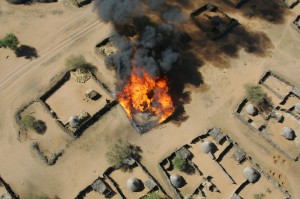
An image of a burning Darfuri village from 2005 (courtesy of Brian Steidle); displaced persons camps have dwellings much closer together and are much more likely to catch fire from an adjacent dwelling.
[10] Militia kills three in hospital in second assault on Um Khair | (March 6 | Garsila, [formerly West] Darfur)
In the second attack by militiamen in Um Khair on Thursday, three people were killed inside a hospital, in addition to the killing of a woman earlier that day. Four people were injured during the militiamen’s latest attack, too. The death toll in the village in Wadi Saleh locality, in [formerly West] Darfur state, has risen to four in less than a day. The pro-government militiamen returned to Um Kheir, 32 km west of Garsila, late that evening, and opened fire on the people inside the local hospital. They killed Ismail Arbab Abdelrahman (20 years) and Abdelaziz Ahmed Bakhit (62 years), while Amna Ishag Basha died on Friday morning from her injuries, one of their relatives told Radio Dabanga. Four other people in the hospital were wounded during the attack.
The relative added that the same militiamen, led by a man called Mohamed Sila, killed Maryam Ishag Adam during their assault on the police station on Thursday afternoon. Four villagers who tried to intervene were injured. The militiamen attempted to spring two gunmen who had beaten a man earlier that day. A witness said that the militiamen, at least a dozen, after their attack on the hospital, set fire to over 20 acres planted with winter crops. In addition, they stole more than 60 livestock animals such as goats and sheep. They were riding on camels, horses, and motorcycles.
The eight wounded villagers are transferred to the hospital in Garsila for treatment. The four dead are buried.
The assaults by Mohamed Sila’s fighters started after two pro-government militiamen were taken into police custody following their beating of a villager who was building a fence for his house. “The armed relatives of the militiamen besieged the station, and fired shots into the air in an attempt to [force the policemen to] release the militants,” a witness told Dabanga yesterday. The residents of Um Kheir confronted the gunmen, after which they opened fire on them, killing Maryam Adam.
[The brazenness of attacks, rapes, pillaging, murders—even within a hospital located in a significant urban environment—are the hallmarks of Darfur at present; it will take many years, if peace is ever achieved, to re-establish trust within the region.]
The Rapid Support Forces (RSF) are much more heavily armed and equipped than the “old Janjaweed”–and they work more cohesively, including with Khartoum’s regular army, the Sudan Armed Forces (SAF). Certainly their general orders come from the SAF.
*******************************
“The victims [of the Holocaust] perished not only because of the killers, but also because of the apathy of the bystanders. What astonished us after the torment, after the tempest, was not that so many killers killed so many victims, but that so few cared about us at all.”
[Elie Wiesel, “Why were there so few?”]
